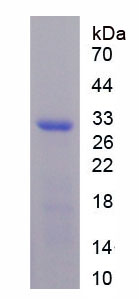Recombinant Occludin (OCLN) 

Tight Junction Protein Occludin TM4 Minus
Overview
Properties
- Product No.RPC228Mu05
- Organism SpeciesMus musculus (Mouse) Same name, Different species.
-
Applications
Positive Control; Immunogen; SDS-PAGE; WB.
If bio-activity of the protein is needed, please check active protein.
Research use only - DownloadInstruction Manual
- CategorySignal transduction
- Source Prokaryotic expression, Host E.coli
- Endotoxin Level<1.0EU per 1µg (determined by the LAL method)
- Subcellular LocationSecreted
- Molecular Mass 30.7kDa, Accurate 30kDa(Analysis of differences refer to the manual)
- Residues & TagsPhe17~Ser107 with His and TRxA Tag
- Buffer FormulationPBS, pH7.4, containing 0.01% SKL, 5% Trehalose.
- Traits Freeze-dried powder, Purity > 90%
- Isoelectric Point6.8
Share your citation
Upload your experimental result
Review
Leave a message
Loading...
Sign into your account
Share a new citation as an author
Upload your experimental result
Review
Please attach serial No. on instruction manual


Contact us
Please fill in the blank.
Name*
Organization
Address
E-mail address*
Telephone
Inquiry*
Verification code*

Sequence

Usage
Reconstitute in 10mM PBS (pH7.4) to a concentration of 0.1-1.0 mg/mL. Do not vortex.
Storage
Avoid repeated freeze/thaw cycles. Store at 2-8°C for one month. Aliquot and store at -80°C for 12 months.
Stability
The thermal stability is described by the loss rate. The loss rate was determined by accelerated thermal degradation test, that is, incubate the protein at 37°C for 48h, and no obvious degradation and precipitation were observed. The loss rate is less than 5% within the expiration date under appropriate storage condition.
Increment services
-
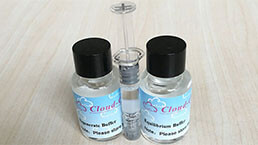 Endotoxin Removal Kit
Endotoxin Removal Kit
-
 BCA Protein Quantification Kit
BCA Protein Quantification Kit
-
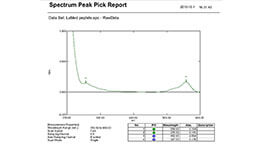 Protein Labeling Customized Service
Protein Labeling Customized Service
-
 Molecular Mass Marker for Protein
Molecular Mass Marker for Protein
-
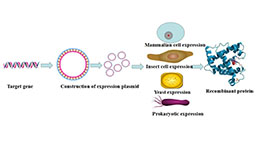 Recombinant Protein Customized Service
Recombinant Protein Customized Service
-
 Monoclonal Antibody Customized Service
Monoclonal Antibody Customized Service
-
 Polyclonal Antibody Customized Service
Polyclonal Antibody Customized Service
-
 Protein Activity Test Experiment Service
Protein Activity Test Experiment Service
-
 Immunoprecipitation (IP) Experiment Service
Immunoprecipitation (IP) Experiment Service
-
 Buffer
Buffer
-
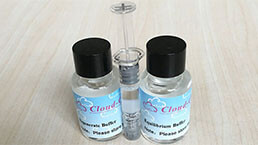 Endotoxin Removal Kit II
Endotoxin Removal Kit II
-
 Real Time PCR Experimental Service
Real Time PCR Experimental Service
-
 Spike RBD Protein (S-RBD)
Spike RBD Protein (S-RBD)
-
 Protein G
Protein G
-
 Protein A
Protein A
Citations
- HIV-1 Tat protein increases the permeability of brain endothelial cells by both inhibiting occludin expression and cleaving occludin via matrix metalloproteinase-9ScienceDirect: S0006899311021408
- Disruption of the Circadian Clock in Mice Increases Intestinal Permeability and Promotes Alcohol-Induced Hepatic Pathology and InflammationPubMed: PMC3688973
- A new panel of blood biomarkers for the diagnosis of mild traumatic brain injury/concussion in adultsPubMed: 25794137
- Methods for Diagnosis and Treatment of Concussion or Brain Injury2016:0103140
- Blood Occludin Level as a Potential Biomarker for Early Blood Brain Barrier Damage Following Ischemic Strokearticles:srep40331
- Traditional Herbal Medicine-Derived Sulforaphene LFS-01 Reverses Colitis in Mice by Selectively Altering the Gut Microbiota and Promoting Intestinal …Pubmed:29375374
- Fas activation alters tight junction proteins in acute lung injuryPubmed: 30385692
- The Effect of Dietary Quercetin on the Glutathione Redox System and Small Intestinal Functionality of Weaned PigletsPubmed: 31426309
- Peripheral blood occludin level as a biomarker for preoperative cerebral edema in patients with brain tumorsPubmed: 32884584
- Intestinal Permeability in Participants With Thermal Injury: A Case Series From a Prospective, Longitudinal Study (HESTIA)
- A comparison of the effects of monotherapy with rosuvastatin, atorvastatin or ezetimibe versus combination treatment with rosuvastatin-ezetimibe and …34492054
- Higher serum occludin after successful reperfusion Is associated with early neurological deteriorationPubmed:35338575
- Impact de l'incorporation d'acides gras à chaine moyenne, de suppléments de levures et d'avoine nue sur la santé intestinale ainsi que sur la consommation …





